|
Nutrition, Health and Population |
|

Source: Food and Agriculture Organization of the United Nations, Statistics Database
Nutrition, Health and Population Links
There are a number of key health issues for developing countries, especially in Africa. They include malnutrition, HIV/AIDS, malaria, tuberculosis and avian flu. This page provides current developments on these issues as well as background.
Nutrition See also Hunger Notes special report on the food and hunger crisis
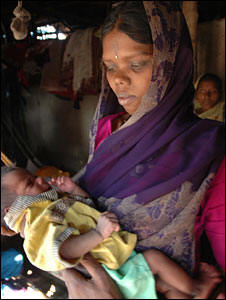
Baby Drupta weighs only 5.5 lbs and coughs incessantly. Photo: BBC
Ignoring India's malnourished Soutik Biswas BBC News November 25, 2008
Premier Says China to Ensure Safe Food Henry Sanderson Associated Press October 26, 2008
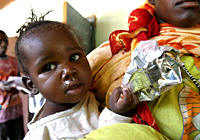
Nutritional supplements and education are helping to save the lives of displaced children in the Central African Republic. Photo: © UNICEF/Holtz
Governments fail to invest enough to prevent malnutrition IRIN February 22, 2008 (You will leave this site.)

A study of Guatemalan babies provided the basis for the research. The findings, published in the British medical journal The Lancet, were based on a three-decade study of Guatemalan males from birth. Those who had been well-fed soon after they were born earned almost 50% more than those who had not. Photo: BBC
Giving babies nutritious food could significantly increase their earning power as adults, new research suggests Mark Doyle BBC News February 1, 2007 (You will leave this site.)
3.5 million children die every year because of lack of food or poor quality food BBC News January 17, 2007 (You will leave this site.)
HIV infection, leading to AIDS, is a major world problem, especially in Africa. In addressing the problem of HIV infection, there have been major concerns.
The first major concern is that African people and governments have been unable to afford the level of care available in the United States and other developed countries, where (expensive) anti-retroviral therapy has not cured HIV/AIDS, but has permitted substantially longer life for those infected. In the last several years this has been partially addressed by two major developments. First is a significant increase in developed country assistance. The second is the (partial) resolution of international property rights disputes over anti-retroviral (ARV) drugs, which has permitted a substantial reduction in the cost of ARV drugs supplied in developing countries.
The second major concern is the persistence of behavior patterns that permit HIV infection. The three principal ways of HIV infection are by sexual contact, though blood transmission (by drug users sharing the same needle, and by medical procedures, especially blood transfusion, not adopting proper safeguards) and by mother to child transmission. Sexual contact is the major means of HIV infection, with mother to child transmission a consequence of sexual contact. HIV testing will alert HIV-positive people that they are HIV positive, and ideally they will take measures to protect their sexual partners against infection, and to not have children or to take measures to reduce the possibility of HIV infection in the newborn.
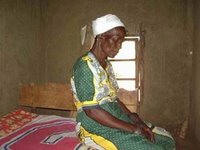
Malawi AIDS patient. The relatively low survival rate of 66% of those on drugs appears to be principally due to two factors: patients starting the treatment late or not having access to proper nutrition. Photo: IRIN News
Anti-retroviral drugs reduce AIDS deaths in Malawi: one-third of those infected taking drugs, with 66% survival rate thus far BBC News August 26, 2008 (You will leave this site.)

As her t-shirt indicates, this Kenyan woman is taking anti-retroviral therapy. US funding through PEPFAR (the President's Emergency Plan for AIDS Relief) has supplied funding for 1.73 million people throughout the developing world, including Kenya. Photo: Waweru Mugo/IRIN
Progress and setbacks in AIDS battle Duncan Kennedy BBC News August 1, 2008 (You will leave this site.) AIDS deaths down 10% in 2007 with greater access to treatment key factor, UN report says Thomas H. Maugh II Los Angeles Times July 30, 2008 AIDS funding binds longevity of millions to US David Brown Washington Post July 26, 2008 (You will leave this site.)
AIDS drugs reaching more people in developing world, UN says Colum Lynch Washington Post June 10, 2008 (You will leave this site.)

Children orphaned by AIDS and aged between 11 and 18, living in Mozambique's capital, Maputo, were given cameras to document their lives. Irenio, 18, took this photo of his brother looking outside their home. Irenio and his 16-year-old sister Saquina have headed their family since March, when they lost their mother to AIDS. Photo: BBC See more pictures
Administration and House leaders agree on bill authorizing a tripling of AIDS funding; money must still be appropriated David Brown Washington Post February 28, 2008 (You will leave this site, be required to register once with the Post and thereafter sign in using your email address.)
African AIDS crisis continues despite $15 billion US initiative Craig Timberg Washington Post February 20, 2008
Bush's out-of-tune AIDS plan (opinion) Michael Swigert and Sena Tsikata Foreign Policy In Focus February 20, 2008
Other diseases and health problems
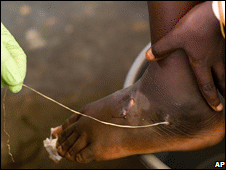
The infection culminates in worms, such as the one shown here, emerging from the sufferer's skin. Photo: Associated Press
Guinea worm 'almost eradicated' BBC News December 6, 2008
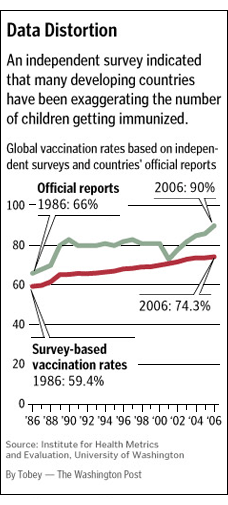
Number of children immunized has been inflated for years David Brown Washington Post December 9, 2008

The infection culminates in worms emerging from the sufferer's skin. Photo: Associated Press
Guinea worm 'almost eradicated' BBC News December 6, 2008
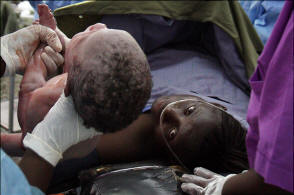
Jemelleh Saccoh gets a glimpse of her new son. A short time later, she had died of complications -- the fate of 1 in 8 women during childbirth in Sierra Leone. Photo: Carol Guzy/Washington Post
A mother's final look at life. In impoverished Sierra Leone, childbirth kills one in eight women. Kevin Sullivan Washington Post October 12, 2008
India bans smoking in public. Health minister says habit may kill nearly 1 million this year Emily Wax Washington Post October 3, 2008 (You will leave this site.) See the World Health Organization's Tobacco Free Initiative.

In Sri Lanka, local government workers, like this man from the Colombo Municipal Council, are regularly deployed to spray insecticide in homes, gardens and along roadways islandwide. Photo: Christine Jayasinghe/IRIN
Eradicating malaria worldwide seen as a distant goal, at best David Brown Washington Post April 26, 2008 (You will leave this site, be required to register once with the Post, and thereafter sign in using your email address.) Sri Lanka: on track to eliminate malaria IRIN April 24, 2008 (You will leave this site.)
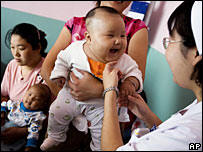
The one-child policy was introduced in the 1970's to reduce population growth. Photo: AP
China may revamp one-child rule BBC News February 26, 2008 (You will leave this site.)
Drug resistant TB 'at new high' BBC News February 26, 2008 (You will leave this site.)
Bush highlights malaria campaign BBC News February 19, 2008
Widespread use of insecticide-treated mosquito nets and state-of-the-art drugs succeeds in cutting malaria deaths in half in Rwanda and Ethiopia David Brown Washington Post February 1, 2008 (You will leave this site, be required to register once with the Post and thereafter sign in using your email address.)
2007 other diseases and health problem stories
2007 Nutrition, Health and Population Hunger Notes Home Page
